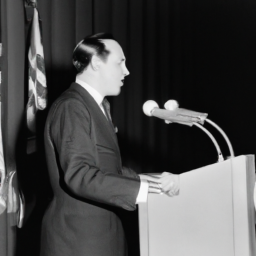Dwight D. Eisenhower was an American military leader and politician who served as the 34th President of the United States from 1953 to 1961. He was born in Texas in 1890 and grew up in Kansas. After graduating from West Point in 1915, Eisenhower served in the U.S. Army during World War I and continued his military career in the interwar years. He became a general during World War II and was instrumental in the Allied victory in Europe. After the war, he served as Army Chief of Staff and then as President of Columbia University before being elected President in 1952.
Eisenhower was a moderate Republican who campaigned on a platform of peace and prosperity. He believed in a strong national defense and was committed to containing communism around the world. He also supported civil rights and appointed Earl Warren as Chief Justice of the Supreme Court, leading to several landmark decisions on desegregation and voting rights.
During his presidency, Eisenhower faced several challenges, including the Korean War, the Cold War, and the growing threat of nuclear weapons. He also oversaw the development of the Interstate Highway System and the expansion of the social safety net through programs like Social Security and Medicare.
